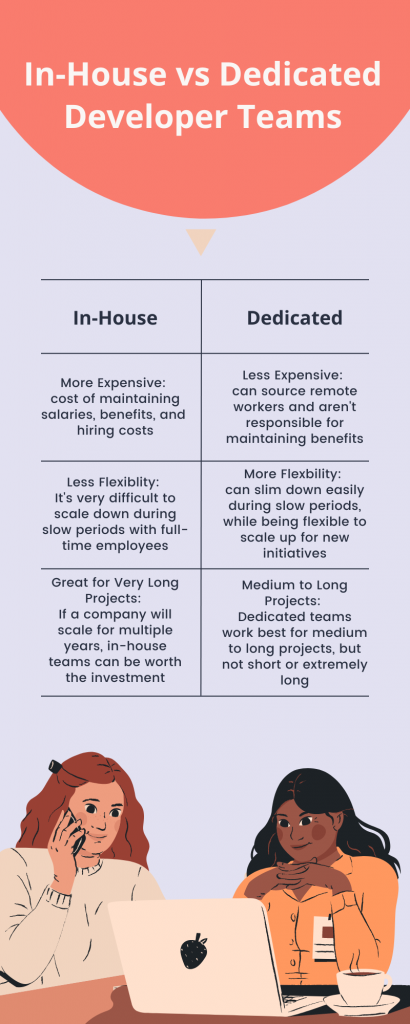What is Flutter Application Development? (Pros and Cons)
If you’ve ever used apps like eBay, iRobot, and Google Pay on your iPhone or Android device, then you’ve experienced Flutter application development....
7 min read
Written by Katie Iannace, May 22, 2023

Finding the right team to work on a software project can be daunting, and sometimes it can feel like you’re facing insurmountable odds of finding the right team for the job. Luckily, a dedicated software development team can provide the expertise and focus necessary to create a fantastic digital product.
A dedicated software development team is a group of skilled software developers who work exclusively on a specific software project or set of tasks. A company usually hires them when they want to focus solely on developing, maintaining, and improving software applications or systems. In contrast, an in-house development team requires significant resources to build, scale, recruit, and maintain. An outsourced dedicated development team is much more nimble and fit, requiring fewer resources as it is intended to adapt quickly according to the demands of a specific project.
Still a bit hazy on the ins and outs of a dedicated software development team? No worries— we’ve got you covered! Let’s dive into the details of what a dedicated team is and how it may or may not be the right choice for your specific needs.
A dedicated software development team is a group of specialists with expertise in designing, building, and maintaining software applications who work exclusively on your project. Many businesses do not have in-house development teams—instead, businesses can turn to a software development company and use their developers. This allows many businesses to achieve their software goals, without having to afford the cost of maintaining multiple full-time salaried positions.
Typically contract software development companies work on a project basis, where the team working on your project has a few different projects they work on throughout the week. Due to the nature of software development, as blockers arise and different scopes of work are implemented, the development needs of a project change week to week, so this is a great strategy.
However, some businesses benefit more from having a team that focuses entirely on just their project. Instead of splitting time, that dedicated development team gives 100% of all the engineers’ focus to the frontend, backend, and design code for one project. What sets a dedicated software development team apart is their unwavering focus and commitment to a specific project or client.
By partnering with a dedicated software development team, businesses can tap into a pool of talent and technical expertise, accelerating their software development initiatives and achieving their digital goals faster than they would otherwise.
Learn more: Is Custom Software Development Right for Your Business?
A dedicated software development team usually consists of a few key roles, each with its own responsibilities and duties. That being said, a dedicated team may have one or several key roles, depending on the company’s specific project needs. Development teams are also typically designed to scale up or down according to a client’s specific demands.
Below are some of the most common roles found in a dedicated development team:
The project manager oversees the entire development process, coordinates tasks, manages timelines, and ensures project goals are met. They are the primary link between the development team and clients and are in charge of communicating any issues that arise. They maintain a high-lever overview of project statuses to make sure benchmarks and development milestones are met.
These are the development team members who write, test, and maintain the software code. They are experts in programming languages and frameworks and must be able to build and implement software solutions based on a project’s requirements.
Learn more: 4 Best Software Development Methodologies
User experience (UX) and user interface (UI) designers focus on creating intuitive, easy-to-use, and visually appealing interfaces for software and websites. They work closely with software engineers to ensure the user interface is accessible, usable, and aligned with the project’s core objectives.
Learn more: UI vs. UX: What’s the Difference?
QA specialists are the first line of defense for testing the software and identifying any bugs, glitches, or performance issues. They develop and conduct test plans and provide feedback to the development team for improvements. Their goal is to ensure the software meets quality standards before release.
DevOps engineers excel at improving collaboration between development and operations teams, streamlining the software development lifecycle by automating processes, expertly managing deployment pipelines, and meticulously ensuring seamless integration, testing, and deployment of the software.
Technical architects are responsible for creating the blueprint of the software’s architecture. They make critical technical decisions and ensure the software is designed for future scalability, security updates, and performance enhancements. They check in with the dev team throughout the entire process.
Business analysts are the bridge between the software team and the business itself. They gather and analyze client, stakeholder, and end-user requirements, working closely with the development team to ensure the software solution meets business objectives and user needs.
Learn more: Key Questions to Ask When Buying Custom Software
When it comes to project management, a variety of roles may be necessary to ensure its success. These roles may vary depending on the specific needs of the organization and the project in question.
Additionally, more complex projects or those following certain development methodologies may require additional or combined roles in order to effectively manage the project from start to finish.
Unlike a traditional in-house development team, a dedicated team often comprises remote employees or outsourced professionals specifically chosen for their expertise in the required technologies and domains. They are dedicated solely to the client’s project and work closely with their stakeholders to understand their requirements, goals, and timelines. The number of skilled developers on a dedicated team can be scaled up or down quickly depending on a project’s needs.
Whether a project requires a large team or just a few skilled developers, a dedicated team can quickly adapt to meet the project’s demands. It is also intended to be a cost-effective solution compared to maintaining an entire in-house team, as it doesn’t require extended recruitment or onboarding efforts to maintain.

Hiring a dedicated software development team offers several benefits, especially for three specific scenarios.
In particular, early-stage startups can benefit from the dedicated team model by utilizing it to efficiently accelerate product development while avoiding expensive hiring costs. It also allows the in-house team to focus on more business-oriented tasks so that the dedicated team can handle the bulk of the development work, fostering rapid growth and efficiency.
When dealing with projects that have unclear requirements or those that require a discovery phase, a dedicated team model can be exceptionally beneficial. The discovery phase plays a pivotal role in shaping the development process, and the dedicated team model ensures that there is enough time and resources to thoroughly explore and test ideas without the risk of overspending. This approach allows for an iterative process and provides more wiggle-room for a team to tackle features with larger variances for development, without blowing through the client’s budget.
The dedicated team model is also well-suited for long-term projects that have the potential for future growth and expansion. For instance, startups that have successfully launched and are scaling can utilize the expertise of a dedicated development team. Mental bandwidth is a valuable resource and developers who know one project deeply are able to implement new features quicker than those who are working on multiple projects. It also eliminates the ‘code relearning’ period that can come with a project-based model. If a project already knows there will be iterations and later versions, those development efforts happen the smoothest when the same team members continue to work on the software.
The costs of hiring a dedicated software development team can vary greatly depending on several factors. Some of the critical factors involved in determining cost include things such as:
It is crucial to keep in mind that although there are costs associated with hiring a dedicated software development team, it may also result in cost savings for your company in areas like recruiting, training, infrastructure, and operations. Since each project and team has its own cost structure, it is recommended to directly discuss pricing and terms with potential service providers to clearly understand the costs involved.
Learn more: Build vs. Buy: Which Option is Best for Your Business?
Think hiring a dedicated development team is the right move for your situation? Ok then— it’s time to know your requirement before selecting the right team for the job. Take a moment to ask yourself a few questions, like:
In addition to answering the above questions, be prepared to conduct some research of your own before committing to any development team. It’s critical that anyone you hire for the job has the relevant skills for the job, so always ensure any candidate has the technical proficiency and experience to get the job done right. Prepare to post a list of requirements for the position and interview your list of candidates, clarifying and negotiating a clear timeline and budget for the job. The more experience a team has, the better. Don’t be afraid to ask for past client references and research any available user feedback on past products a candidate has previously created.
A dedicated software development team or even a dedicated software developer brings a deep level of expertise and specialized knowledge to many situations and can provide an agile, cost-effective way to handle software projects for startups, projects with unclear requirements, and projects that are likely to need help scaling in the near future.
While costs can vary according to project size, duration, and specifications, it’s essential to consider your full scope of needs before choosing a dedicated development team or a dedicated developer.
Still have questions about hiring a dedicated development team or a dedicated developer for your project?
Designli would love to help!
Our on-demand product teams include developers and product owners with extensive backgrounds in UX/UI and graphic design principles. You can trust our self-sufficient team to solve real business problems rather than simply doing development grunt work.
We’ll work alongside your existing employees to become an active part of your business, serving as long-term partners and product owners.
Great product support doesn’t just stop when the product is done.
To find out more, get in touch for a consultation.
You might also like:
Subscribe to our newsletter.

If you’ve ever used apps like eBay, iRobot, and Google Pay on your iPhone or Android device, then you’ve experienced Flutter application development....

For a software development project to be successful, it needs to be effectively managed using the best software development methodology for its...

Custom software takes significant time and investment to build and deploy, so you don’t want to make a rash decision. Forbes reports that the annual...